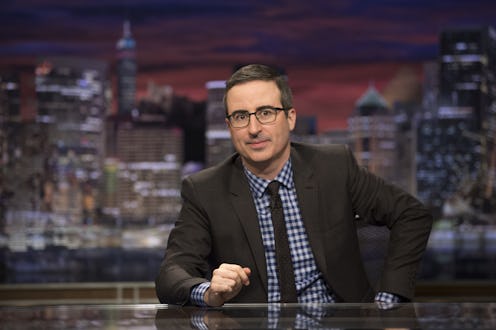Entertainment
If You Miss John Oliver, Here's When 'Last Week Tonight' May Be Back With More
Now that Last Week Tonight with John Oliver has lowered the curtain on a fourth season of his entertainingly informative show, fans may already be looking ahead and wondering: when will Last Week Tonight return for Season 5? If you’re one of those people asking, have no fear; while we don’t know exactly when, the show will absolutely be returning.
Though Last Week Tonight was originally green-lit by HBO for two years with an option for an extension, back in September Oliver signed a three-year extension that will see the series continue through 2020, with 30 episodes per season. That means that Oliver will be around to cover the next presidential election — something that fans will no doubt be hungry for his perspective on. Despite Last Week Tonight being confirmed to air through 2020, there is, as of yet, no official premiere date for Season 5. But, with a bit of sleuthing, we can make an educated guess that it’ll be sometime in February of next year, given the fact that with the exception of the first season, each season premiered at some point in the month of February.
In a grand total 119 episodes in four seasons, Last Week Tonight has managed to be both hilarious and informative. Oliver's deep dives into otherwise dense topics have had noticeable impact on bail reform, women's scholarships, net neutrality, for-profit colleges, and even FIFA.
While Last Week Tonight's style has always focused heavily on politics, the past year has seen all of late night get increasingly political, giving Oliver more competition from competitors with shows that air nightly, as they can respond faster to the latest political gaffe or crisis. While no stranger to political commentary, Daily Show and Colbert Report alum Stephen Colbert doubled down on his politics coverage while getting comfortable helming The Late Show, despite initially broadening his focus to include lighter topics. Jimmy Kimmel's switch into the political arena, meanwhile, was more personal. He was compelled to get explicitly political following his newborn son’s emergency open-heart surgery, giving an impassioned plea for affordable healthcare that went viral. That inspired Senator Bill Cassidy to coin the phrase, “The Jimmy Kimmel Test,” which would make sure that no person is denied health care because they can't afford it.
In the hyperpolitical Trump era, the late-night host who got the most criticism for steering clear of politics was Jimmy Fallon, whose infamous petting of the then-presidential candidate's hair during an interview was widely criticized for lacking the critical rigor viewers have come to expect from late-night interviews. Since then, his Trump jokes have been relatively infrequent and more diluted than those coming from his late-night competitors. Many have speculated that Fallon's avoidance of politics has led to a dip in his ratings (Colbert's Late Show finally usurped Fallon's ratings juggernaut The Tonight Show in early 2017). While that's hard to prove concretely, it’s clear from the shift in ratings that this new trend of political issue coverage by late-night talk show hosts is worth following because, despite being TV personalities, they can have real-world impact. As Vanity Fair notes, topics like the FCC’s changes and the GOP’s healthcare bill were very much affected by Oliver and Kimmel’s efforts to draw attention to them.
But no matter when the new season of Last Week Tonight ends up premiering, if it is anything like past seasons, there will be plenty of funny and fascinating segments on the show. So here's hoping for more laughs, and of course, more positive social change. So, take your time John Oliver, us fans are just excited for your return.
